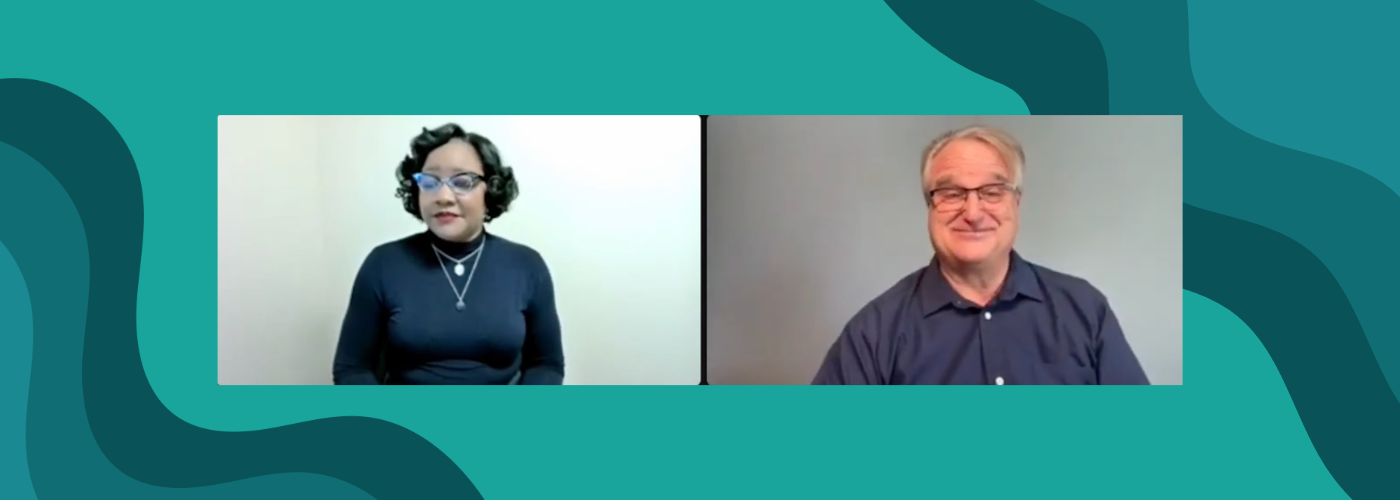Often, deaf people struggle to remain engaged in interpreted sessions. This is on top of the challenge of obtaining, processing, and retaining information in real time when delivered by interpreters. Solutions are needed to increase the engagement of deaf participants in interpreted sessions.
On March 16th, NDC hosted a Deaf Centered Interpreting Webinar wherein Dr. Thomas Holcomb, PhD, and Aundrea Love, NIC, aimed to answer the question “How can interpreting become more deaf-centered?” by proposing a deaf-centered interpreting model. This model emerged from an ongoing effort to improve access and participation for deaf participants in interpreted sessions. This presentation focused on the changing view of the delivery model from merely providing access to increasing the effectiveness of interpreting work by removing barriers that have made it difficult for deaf participants to engage fully in interpreted sessions.
Watch the Full Video Now!
Deaf Centered Approaches to Academic and Professional Success of Deaf and Hard-of-Hearing People
The session included examples of deaf-centered interpreting in practice, strategies for interpreters to facilitate greater engagement for deaf students, and strategies for disability services professionals to center deaf students when coordinating or planning for interpreting services.
Dr. Holcomb conceptualizes access on three levels: first, getting interpreters in the room; second, making sure the interpreters are qualified and have the right experience & expertise; third, ensuring that interpreters do their work in a way that does not inhibit student engagement. When it comes to the content of what is interpreted, it must be rooted in access and accessibility and not just message equivalency. There are three important considerations:
- Message equivalency is not to be minimized.
- Ensure that the person watching actually understands what is being conveyed. Just like Certified Deaf Interpreters (CDIs), hearing interpreters should be committed to making sure that the deaf person understands everything, to expand on concepts when needed, and to alter the pace if necessary.
- Access equivalency, which is the ease with which a deaf participant feels they can participate in this otherwise hearing environment, must be a goal. Providing an equivalent experience is more than just delivering the words or the signs that are being expressed.
The main takeaways from this presentation include examples of deaf-centered interpreting in practice, strategies for interpreters to facilitate greater engagement for deaf students, and approaches that Disability Service professionals can use to center deaf students when coordinating or planning for interpreting services.
Deaf Centered Interpreting: D.E.A.M.
Thomas Holcomb, PhD — Professor, Deaf Preparatory Program at Ohlone College
“This has led us to consider a new model of interpreting which is represented by the acronym DEAM or “deam,” which is a portmanteau of Deaf Dream Team. It’s an arrangement of interpreting services that is most conducive to deaf participation. Deaf friendly, while at the same time recognizing and and respecting the challenges that interpreters face in doing their job. The goal is to have a model that provides a win-win situation so that interpreters can feel good about their work and deaf people can get the access that they desire.”
Deaf Centered Interpreting: Optimal Access
Aundrea Love, NIC — Staff Interpreter, University of California, Santa Barbara
“It wasn’t until our discussion that it came to my realization, because now, as I do look back at my interpreter preparation program, it was pretty much drilled into us that message equivalency was the optimal goal. That what you hear is what you put out. What you see is what you voice at 100%. But during our interpretation preparation program, they never once mentioned what the deaf individual’s experience was. Can they actually comprehend the message, or were we only focused on equivalency? That is the reason why I feel that DEAM is a mindset and help me completely understand. It was definitely an ah-ha moment for me.”
Deaf Centered Interpreting: Collective Learning Experience
Thomas Holcomb, PhD — Professor, Deaf Preparatory Program at Ohlone College
“In hearing spaces, being polite and respectful means being passive, listening and taking copious notes. Questions are held until the appropriate time, and you indicate your need for a question by raising your hand. It’s a very particular way of attending and participating. When you’re in a deaf space. It’s very different. It’s much more engaging. People are much more engaged, more interactive. There’s much more back channeling. There’s much more comprehension checking going on amongst the deaf audience. It’s very different compared to that of a hearing space.”
More from Ohlone College
NDC is honored to have partnered with Ohlone as part of its 50th anniversary of deaf services. As part of the festivities, Ohlone is doing a series of webinars about Deaf Centered approaches to student success in partnership with other organizations such as GURC, California School for the Deaf, and Ohlone student organizations. Find out more at https://www.ohlone.edu/50yearsdeafpride.
Want to Learn More?
Find more resources and stories below and visit our interpreting resources page for more information on this topic
- Best Practices in Access: Deaf Interpreters
- Best Practices in Access: Interpreter Consistency
- Interpreting Topic Page
- Avril’s Story: Consistent Interpreting in College
- Smitha’s Story: Cultural Fit of Interpreters
- Naomi’s Story: Benefits of Deaf Interpreters
- Michelle’s Story: Using Interpreters
- Shira’s Story: Role of Interpreters
- Rezenet’s Story: Role of Interpreters









